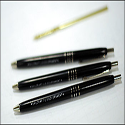|
Koramei posted:
Though I do not believe this skittishness applied to warhorses in the middle ages (an admittedly controversial opinion), I could see it applying to classical cavalry. However, these cavalrymen would, with their longer spears, at least be trying to score hits on the men on foot, and a thin, and bendable head is much more difficult to fight with than a plain spear, especially if the latter is a good 3 feet longer. The notion of there being a stiff and soft necked javelin may be viable but I would like to see more evidence. Note that I do not think that, barring exceptional armor, desperation, or arrogance a rider would want to charge into a wall of spears either. Rodrigo Diaz fucked around with this message at 02:46 on Nov 14, 2013 |
|
|
|

|
| # ? Apr 25, 2024 20:12 |
|
Koesj posted:It should probably be the AMX-30 in your last paragraph, the -13 is the light tank platform with the oscillating turret. MBTs really aren't my area of expertise, so I picked a French post-war design I was vaguely familiar with. I guess the AMX-30 fits in that list better.
|
|
|
|
Smoking Crow posted:Also, did the British actually do anything innovative, or did they just steal everything from the Dutch? (They did corporations, crop rotation, military tactics, and the British got rich off it.) Everybody stole from everybody. There are a billion times more examples of tech spreading than indigenous development of the same concept.
|
|
|
|
War is really depressing. Does it ever get depressing reading about real people killing real people?
|
|
|
|
PrinceRandom posted:War is really depressing. Does it ever get depressing reading about real people killing real people? It happened. We might as well try to sort out the hows and whys. Do you not watch tv or anything, because it's not like this stuff has EVER stopped. In my opinion, not in the way I think you mean. On occasion I'll run across an individual event that serves as a downer, but as far as the subject as a whole, no.
|
|
|
|
my dad posted:Serious question: What's the most effective shield shape? Samuel L. Jackson PrinceRandom posted:War is really depressing. Does it ever get depressing reading about real people killing real people? Yes. Although as a military historian I like to think that writing about this stuff might make a difference in whether there's more or less of it in the future.
|
|
|
|
Godholio posted:It happened. We might as well try to sort out the hows and whys. Do you not watch tv or anything, because it's not like this stuff has EVER stopped. No, I'm reading King Leopold's Ghost right now and sometimes I have to stop because people suck sometimes.
|
|
|
|
The old MilHist thread is in the Goldmine now so if you want to link up old discussions, or point out particularly excellent posts, please proceed!
|
|
|
|
PrinceRandom posted:No, I'm reading King Leopold's Ghost right now and sometimes I have to stop because people suck sometimes. I have a media job (writing and editing) involving military/defense/national security issues. I don't think the subject has ever made me depressed, but it's possible I haven't been doing it long enough. I've certainly been outraged by some things, and I've grown more sensitive to violence and particularly violent images. Godholio posted:It happened. We might as well try to sort out the hows and whys. Do you not watch tv or anything, because it's not like this stuff has EVER stopped. Vincent Van Goatse posted:Yes. Although as a military historian I like to think that writing about this stuff might make a difference in whether there's more or less of it in the future. Well, it might be different with military historians since they do a great job of dispelling myths. James McPherson (and others, he's just an example) has helped demolish the Lost Cause, which I hope has helped America become a more inclusive place. I'm not sure it's true of journalism. Ta-Nehisi Coates had a great post recently about post-war Europe, Tony Judt, civil rights, etc. He wrote this: quote:Postwar is a rejection of the kind of moralizing tidiness which marked my own early education about Europe, World War II and its aftermath. Judt has the courage to look dead-eyed at ideology and all its limitations without lapsing into nostalgia or cynicism. The writer Jake Lamar once called this "ice-water vision." If I could cultivate any intellectual quality, outside of curiosity, it would be Judt's "ice-water vision." I am often asked for solutions to many of the problems I raise. Almost as often I demur. That is because I am increasingly convinced that my particular great problems don't actually have solutions, that the ultimate answer is "Game Over: You Lose" or more specifically "Race War: Whites Win. Again."
|
|
|
|
Rodrigo Diaz posted:Mobility was important to the English, you are absolutely correct. However, your notion on the French mentality is mistaken. Quite a few historians and writers argue that things didn't really start turning around for the French until the concept of France as a nation unified under one king really took root, even if that is a simplistic way of looking at things. Pressure on King Phillip by his nobles certainly forced him to act recklessly and enter battle without proper preparation, but chivalric ideals and feudal rivalries amongst the French knights certainly didn't do them any favors when the English proved that they were very capable of adapting their tactics based on experiences in past battles. Much of their eagerness to do battle at Crecy was because they thought that the cavalry charge would be decisive, particularly against a much smaller army that was mostly on foot. The French cavalry just kept throwing themselves against the English lines and kept being repulsed again and again. The fact that Edward had most of his knights dismount and fight on foot is also remarked upon in just about every account of the battle and the military value of the common Welsh longbowman is something that was firmly established in this and other battles in the early stages of the Hundred Years War. Rodrigo Diaz posted:Courtrai took place 44 years before Crecy, and infantry resisting cavalry was nothing new even then. It happened at Hastings in 1066, at Bremule in 1119, at Jaffa in 1192 at Bouvines in 1214, at Sterling in 1297, and in many other instances. The notion of the 'infantry revolution' is exceedingly short-sighted at best. While the defeats of Courtrai and Bannockburn did come as something of a surprise this is only applicable in a contemporary context, as during the mid-13th century infantry was not much used in a number of significant European battles (Muret, Tagliacozzo, Lewes, Dunbar) though their importance was still recognised in Louis IX's crusade. This is very true. What I thought was important to note was that the correct employment of longbows and pikes by well-trained common troops could play a decisive role in battles of the time, and that the English took advantage of this knowledge early on in the Hundred Years War.
|
|
|
|
Rodrigo Diaz posted:Though I do not believe this skittishness applied to warhorses in the middle ages (an admittedly controversial opinion), I could see it applying to classical cavalry. However, these cavalrymen would, with their longer spears, at least be trying to score hits on the men on foot, and a thin, and bendable head is much more difficult to fight with than a plain spear, especially if the latter is a good 3 feet longer. I have never been too swayed by the 'also a pike' theory of the pilum. It's not great for that purpose, and the Romans used both concurrently in the era of the manipular legion. I don't believe there's any direct explanation in literature, but I see the elimination of the triarii and their Etruscan hoplite influenced pikes as a sign that disciplined heavy infantry just aren't that vulnerable even to heavy cavalry from the front and with secure flanks. The theory goes that the legionaries would brace against the initial shock of the charge, and then have a bunch of horsemen in front of them. It takes time to recover from the charge and retreat, and during the time the front row of horsemen are pinned against the legionaries by the horsemen behind them, the horses have very vulnerable tendons in their legs. At the very least, the Parthians showed no interest in charging a square of prepared legionaries, despite having the heaviest cavalry available at the time. So as a 'and if you absolutely have to, you can poke at cavalry with it' I think one might make a point. As a 'and this is how we deal with cavalry' I think it makes no sense. If heavy infantry needed pikes to deal with cavalry, the triarii would not have gone away. The 'stiff and soft necked' theory makes some sense tactically, but doesn't have overwhelming archaeological evidence to support it. There are certainly both varieties attested to in the same time period, but my memory is no finds have been make of both in the same place. Since we don't exactly have a dig on Pompey's armory, it could be that both existed without a determinate pattern, up to conditions, or even the opinion of particular generals or legions, etc. Edit: Later equipment changes seem to back this up. In the face of increasing cavalry attacks, the Eastern Empire turned to making their own heavy cavalry. The Western Empire (at least for a time) reacted by substantially increasing the number of slingers in armies expecting to deal with large numbers of cavalry. There weren't any returns to phalangite formations or anything like them that I can think of for a long time. Centurium fucked around with this message at 05:36 on Nov 14, 2013 |
|
|
|
PrinceRandom posted:War is really depressing. Does it ever get depressing reading about real people killing real people? He opens with an example. Robert Limpert, a 19 year old student who was unfit for military service in April 1945 (so you know he was basically crippled at that stage). He lived in Ansbach and when the allies were approaching the town he attempted to cut the telephone wires to the local military HQ so as to prevent an opposed taking of the town. He was caught, the local CO is notified and rushes into town, where Limpert is "tried" in about five minutes and sentenced to death by hanging. They get the noose around his neck, but he manages to wiggle free and makes a run for it. The local cops catch him and drag him back. The crowd punches and kicks him as he is dragged back to the gallows. He is hanged. The rope breaks, he hits the ground. They hang him again. He dies. The CO orders him left there "until he stinks" and then within an unspecified "short" time "requisitions" a bike and gets the gently caress out of dodge. Four hours later, the allies take the town. No shots are fired. They cut his body down. So yeah, sometimes the sheer senselessness gets to you, and I think it should.
|
|
|
|
PrinceRandom posted:No, I'm reading King Leopold's Ghost right now and sometimes I have to stop because people suck sometimes. The psychological impact of dealing with the enormity of human evil is not a trivial matter. I know a professor at American University who works extensively on the bomb. He has a preemptive talk with graduate students doing archival research on the subject after several students felt suicidal after spending days in small archives reading rooms examining the calculations around ending the world. Apparently the papers considering countervalue targeting (screw military units, command structures, and missiles, just explicitly try to annihilate as many population centers as you can) are particularly noxious to mental health.
|
|
|
|
Centurium posted:The psychological impact of dealing with the enormity of human evil is not a trivial matter. I know a professor at American University who works extensively on the bomb. He has a preemptive talk with graduate students doing archival research on the subject after several students felt suicidal after spending days in small archives reading rooms examining the calculations around ending the world. Apparently the papers considering countervalue targeting (screw military units, command structures, and missiles, just explicitly try to annihilate as many population centers as you can) are particularly noxious to mental health. Whoa, that's really interesting. I'd... actually like to see those papers.
|
|
|
|
VanSandman posted:Whoa, that's really interesting. I'd... actually like to see those papers. I'd also be interested in that. Cold War brinkmanship is fascinating, and a little uplifting because it never turned into a nuclear war.
|
|
|
|
Yeah count me in as well, the actual targeting mechanics haven't been that well documented AFAIK.
|
|
|
|
Koesj posted:Yeah count me in as well, the actual targeting mechanics haven't been that well documented AFAIK. Yeah, friend of mine has had to do some serious digging. I think his paper is being presented at the OAH meeting. I'll ask him about it.
|
|
|
|
Centurium posted:The psychological impact of dealing with the enormity of human evil is not a trivial matter. I know a professor at American University who works extensively on the bomb. He has a preemptive talk with graduate students doing archival research on the subject after several students felt suicidal after spending days in small archives reading rooms examining the calculations around ending the world. Apparently the papers considering countervalue targeting (screw military units, command structures, and missiles, just explicitly try to annihilate as many population centers as you can) are particularly noxious to mental health. There's a goon in Goons in Platoons that talked about his time spent on a military position in Western Germany that was considered to be destroyed in less than half an hour if the cold war went hot. They were considered to be mere objects because who the gently caress cares about the well being of a unit that is meant to die, yet they were forced to be the cream of the crop in pretty much every single aspect, from military to administrative and technical work. Can't remember the name of the goon but the thread is still alive i think, i'll try to fish it up if a GiPer doesn't do it first. If his tales are strong enough to read then i imagine what an entire platoon could say about their experience, much less what they'd say in case of an active war. How common are memories of wars that are not made by the upper echelons of militaries pre-WWI? Hegel might awnser me this. I wonder just how much the common peasant\mercenary\condottieri registed about their military days. Can't imagine what a memory from a French soldier during the Napoleonic wars would be like. "Dear diary, i went from Vendee to Italy, back to Austria , then to Egypt and Spain. My life is corpses." Godholio posted:Everybody stole from everybody. There are a billion times more examples of tech spreading than indigenous development of the same concept. 
Mans fucked around with this message at 08:10 on Nov 14, 2013 |
|
|
|
Mans posted:Can't imagine what a memory from a French soldier during the Napoleonic wars would be like. I have a book for you. This book got me really interested in history and I read War and Peace shortly afterwards. It's the memoirs of a French sergeant during the invasion of Russia. Link.
|
|
|
Mans posted:There's a goon in Goons in Platoons that talked about his time spent on a military position in Western Germany that was considered to be destroyed in less than half an hour if the cold war went hot. They were considered to be mere objects because who the gently caress cares about the well being of a unit that is meant to die, yet they were forced to be the cream of the crop in pretty much every single aspect, from military to administrative and technical work. It's 50 Foot Ant and his stories are likely bullshit. edit: Just so there is some content: Is "A Savage War of Peace" a decent history of the Algerian War of Independence? vains fucked around with this message at 08:32 on Nov 14, 2013 |
|
|
|
|
MassivelyBuckNegro posted:It's 50 Foot Ant and his stories are likely bullshit. Bullshit flavored yes, but the guy was probably there going by the amount of stuff he couldn't make up otherwise.
|
|
|
|
Rodrigo Diaz posted:Roman pila did not have lead tips. There was no lead in them anywhere. It sounds like you might be partly confusing them with the lead-weighted darts of Vegetius' time, the plumbatae, which were short and did not bend. The neck of the pilum I have been told was made of softened iron, but given my personal encounters with archaeologists listing steel as iron and not doing any metallurgical tests, I am not totally sure. Yeah, that's right, I can't remember at all where I got the lead thing from. Still, as far as you can trust Caesar (and I trust him implicitly), the Gauls were totally owned by the pilum to the shield thing. Also, two funny facts about inter-war tank production that I can hardly source right now because I have to leave: - I distinctly remember reading that in 1939 the USA had less tanks than Poland. - If the inter-war Polish army got rid of the cavalry, the savings from the horse food alone would allow them to field something like a platoon of 7TP tanks a year. Feel free to prove me wrong on any account.
|
|
|
|
The pre-1940 US Army was a complete poo poo show. In a 'would lose a land war to Romania' kind of way. Roosevelt spent the next two years desperately trying to bring it up to speed and it was still way behind when the US finally went to war.
|
|
|
|
PrinceRandom posted:War is really depressing. Does it ever get depressing reading about real people killing real people? If you are worried about depressing, avoid WWII eastern front stuff. That is some really harrowing poo poo.
|
|
|
|
PrinceRandom posted:War is really depressing. Does it ever get depressing reading about real people killing real people? Boy does it ever. Antony Beevor's Stalingrad and Max Hastings' Armageddon were a real struggle to get through, and I found myself getting viscerally angry at everyone who was behind Gallipoli, Kaiser Wilhelm's dick-waving with the High Seas Fleet and Churchill's myriad hare-brained schemes. I find that it's a better emotional investment than reading about fictional people killing fictional people though, if only because it was there, it happened, it's not within the realm of the hypothetical, and we can learn something from it.
|
|
|
|
PrinceRandom posted:War is really depressing. Does it ever get depressing reading about real people killing real people? Of course. That's why I personally prefer reading about restoring order and politics of post-conflict societies rather than about conflicts themselves. That way the lesson becomes "how to deal with violence and its legacy".
|
|
|
|
Shimrra Jamaane posted:The pre-1940 US Army was a complete poo poo show. In a 'would lose a land war to Romania' kind of way. Roosevelt spent the next two years desperately trying to bring it up to speed and it was still way behind when the US finally went to war. That they entered the war with the M3 as their primary tank really tells you all you need to know. Mans posted:How common are memories of wars that are not made by the upper echelons of militaries pre-WWI? Hegel might awnser me this. I wonder just how much the common peasant\mercenary\condottieri registed about their military days. Well, for the longest time the peasants/enlisted soldiers couldn't really write. This starts to improve by the 18th century, but you still have to remember that even well into the 20th century, there was little reason for peasants to actually write letters or diaries. I've heard from researchers working on letters written during WWI that these letters were probably the first time these soldiers had written anything since school. There are exceptions, of course, like Hagedorf in the 30YW.
|
|
|
|
What's the origin of the staff numbering system (for the US military, at least)? 1-Personnel/Admin 2-Intelligence 3-Operations 4-Logistics/Supply 5-Plans 6-Communications 7-Training 8-Finance/Comptroller 9-Strategic Messaging/Information Operations/Civil Military Operations/New name for this of the year I know it's based off the Prussian staff system but haven't been able to find a good explanation of why which section was assigned which number.
|
|
|
|
steinrokkan posted:Of course. That's why I personally prefer reading about restoring order and politics of post-conflict societies rather than about conflicts themselves. That way the lesson becomes "how to deal with violence and its legacy". Man, I find that far more depressing. War at least generally has an end.
|
|
|
|
I've been reading through Adrian Goldworthy's biography of Caesar and he mentions pila in it. Specifically, he mentions that the whole "designed to bend" thing is bullshit. They certainly did occasionally bend but it was more of a side effect. Something designed to bend would be kind of an iffy weapon at best (since you wouldn't know if it would bend immediately on impact and you couldn't use it as a spear in a pinch).
|
|
|
|
Amazing effortpost Ensign Expendable. However,Ensign Expendable posted:Recalling your high school physics, the kinetic energy of an object increases linearly with its speed, but quadratically with its mass. It is twice as hard to make a shell go twice as fast, but four times as hard to launch a shell with twice the weight at the same speed. Ek=mV2/2
|
|
|
|
About the tank post, the Panzer III was initially armed with the 37 mm gun, which actually happened in the best nazi tradition: it was supposed to have the 50 mm gun but the manufacturers didn't care about the directives the Wehrmacht (and Hitler) gave. If i remember correctly, it had to do with re-designing the turret of the tank which they didn't want to do because they had already manufactured a whole bunch of turrets so the manufacturers would have lost money on that. Hitler and Guderian apparently got mad because of this because the 37 mm gun was already becoming obsolete at the start of the war.
|
|
|
|
PrinceRandom posted:War is really depressing. Does it ever get depressing reading about real people killing real people?  . . Mans posted:How common are memories of wars that are not made by the upper echelons of militaries pre-WWI? Hegel might awnser me this. I wonder just how much the common peasant\mercenary\condottieri registed about their military days. They're less common during the Thirty Years' War than will be later, but far more common than you'd think. Even at the time it was going on, people recognized that the 30YW was a big deal and a lot of them wanted to record what was going on for posterity. Moreover, this time also saw an expansion of literacy, with more people able to record what was going on. Most people still couldn't read or write, but more and more people could. HEY GUNS fucked around with this message at 12:48 on Nov 14, 2013 |
|
|
|
AATREK CURES KIDS posted:I have a book for you. This book got me really interested in history and I read War and Peace shortly afterwards. It's the memoirs of a French sergeant during the invasion of Russia. http://www.amazon.com/The-Diary-Napoleonic-Foot-Soldier/dp/0140165592 It's interesting to think about the different ways people from very different social classes experience the same event. Fewer wistful memories of Paris in Walther's diary, more shooting off muskets indoors and getting toddlers drunk. 
HEY GUNS fucked around with this message at 13:19 on Nov 14, 2013 |
|
|
|
Anyone mind throwing up an effort post or some reading material on the evolution of small unit tactics? Earliest to now.
|
|
|
|
Mans posted:There's a goon in Goons in Platoons that talked about his time spent on a military position in Western Germany that was considered to be destroyed in less than half an hour if the cold war went hot. "x will be destroyed in y minutes when the war starts" is a universal truth that applies to anything, if military hearsay is to be believed. Common example: "Russians built all their vehicles to a lower standard because they were calculated to be destroyed in the first five/fifteen/thirty minutes of combat". Which is obvious hogwash. What good in a mobile war is a vehicle, whether tank or truck, that doesn't manage a 300km march without breaking down?
|
|
|
|
Nenonen posted:"x will be destroyed in y minutes when the war starts" is a universal truth that applies to anything, if military hearsay is to be believed. Common example: "Russians built all their vehicles to a lower standard because they were calculated to be destroyed in the first five/fifteen/thirty minutes of combat". Which is obvious hogwash. What good in a mobile war is a vehicle, whether tank or truck, that doesn't manage a 300km march without breaking down? Isn't it the NATO powers that built their AFVs to withstand short burst of activity, but incapable of prolonged operations without maintenance? I though the Soviet design philosophy - at least in the Cold War - was to make sure that their tanks would survive on their own, without engineers for as long as possible - which would make sense, considering their tradition of strategic thinking.
|
|
|
|
steinrokkan posted:Isn't it the NATO powers that built their AFVs to withstand short burst of activity, but incapable of prolonged operations without maintenance? I though the Soviet design philosophy - at least in the Cold War - was to make sure that their tanks would survive on their own, without engineers for as long as possible - which would make sense, considering their tradition of strategic thinking. That's my understanding of why the autoloader/human loader design split happens. The human can move faster in a pitched battle but obviously gets tired. The autoloader just keeps on going.
|
|
|
|
How useful were pre gunpowder era war engines (catapults, ballistas etc.) on field battles? Were any of the smaller ones ever used on sailing ships, or just on demasted galleys?
|
|
|
|

|
| # ? Apr 25, 2024 20:12 |
|
Last thread had a long chat about different naval guns and artillery development in general. It left me thinking about the effectiveness of certain types of artillery. For example, I learned that the 16 inch (406mm) naval cannon delivers only about 150 pounds of TNT in one round. What is the impact of such round when it hits the target? Penetration? Kill radius of the shrapnel? Are there any charts on the effectiveness of artillery cannons?
|
|
|




































